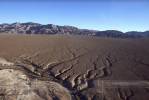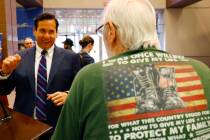Nevadans in thick of sage grouse drama on Capitol Hill


Congress is on a path to extend for another year a restriction on the Interior Department’s potential listing of the sage grouse as an endangered or threatened species.
But efforts by some Western Republicans to place stronger checks on the department have run into complications. There is much going on behind the scenes as the U.S. Fish & Wildlife Service closes in on a September deadline to announce whether land-use restrictions should be enforced for the chicken-sized bird with the puffed-out chest whose habitat has been shrinking across 11 states.
Rep. Mark Amodei, R-Nev., is looking for votes for a plan to prohibit Interior from withdrawing federal land to conserve or restore sage grouse habitat without a governor’s approval.
The Amodei amendment would prevent the government from putting into place habitat conservation measures unless “affected state, county and local land use and zoning authorities have been given a reasonable opportunity to review and approve the decision.”
The Republican from Carson City, whose district contains most of the land in Nevada that would be affected by a species listing, said he was seeking the strongest voice for states and communities that stand to be the most affected by grouse-related controls on energy exploration, mining and grazing.
Amodei kept the amendment in his pocket when the House Appropriations Committee debated the annual Interior Department spending bill last week, acknowledging he did not have the votes to get it approved by the 51-member panel.
He said he was considering whether to offer an amendment when the Interior bill is taken up on the House floor in the coming weeks.
“We’re in the process now of running the traps,” he said.
Meanwhile, Western Republicans in the Senate were forced to withdraw an amendment that would have delayed a federal decision on the sage grouse for 10 years while directing the government to support state-level efforts to protect the bird’s habitat.
Nine senators, including Dean Heller of Nevada, wanted to place the amendment onto a defense authorization bill after military services complained grouse-related land controls could hamper activities on training ranges, including the Hawthorne Army Depot and the Fallon Naval Air Station.
But the amendment was withdrawn after Republicans debated it among themselves at their weekly luncheon.
“The majority were concerned that it would give Obama a reason to veto the (defense) bill,” Heller said Wednesday on a conference call with rural Nevada media that was reported by the Elko Daily Free Press.
Like Amodei, Heller said the upcoming Interior Department spending bill might be the best vehicle for sage grouse debate.
“You haven’t heard the end of it, by any means,” he said.
Congress passed legislation last year that sought to prevent the Department of Interior from formalizing a sage grouse listing, and a similar provision looks certain to pass this year as well.
But it remains unclear what impact that would have. Interior attorneys have told Secretary Sally Jewell that the Fish & Wildlife Service still could make it clear the bird was being listed, doing everything short of preparing and signing formal paperwork.
— Steve Tetreault
HILLARY WIGGLE ROOM?
U.S. Sen. Harry Reid has said he was confident the Yucca Mountain project would remain dead through the term of the current president “and the next one.” That was a reference to his White House choice, Hillary Clinton.
When she ran for president in 2008, Clinton opposed the controversial Nevada nuclear waste project. But was that a crack of wiggle room in an interview she gave Thursday to political pundit Jon Ralston?
Ralston asked if Yucca Mountain as a nuclear waste dump would be “off the table” in a Clinton administration.
“Well, it is off the table based on what I know right now,” she responded.
Clinton said she has opposed the project “based on the research that was made available. We do need to figure out what we’re going to do with nuclear waste.” She mentioned the commission that has recommended new strategy rather than “just default to Yucca Mountain.
“Let’s talk to the experts, and let’s try to determine what’s the best place, the different states and regions of the country should use for this disposal.”
Ralston: You’re not keeping it completely off the table? You’ll keep it in mind if new information comes to light?
Clinton: Well, it’s off the table now based on what I know. I think science is always changing. But based on what I know, where it is, the geology of where it is, it’s off the table.
Ralston concluded Clinton was “not unequivocal” on Yucca. A Clinton aide said over the weekend she answered the question the same way in 2008, and she still has concerns about the program.
Speaking for Reid, aide Kristen Orthman said that Yucca is dead, “and the reason it is dead is thanks to Democrats like Bill Clinton, Barack Obama and Hillary Clinton.”
Others running for president vary on Yucca Mountain. Bernie Sanders is against Yucca. Marco Rubio, Ted Cruz, John Kasich and Ben Carson have said they would favor opening the site to nuclear waste.
In Reno last month, Jeb Bush said he does not believe high-level nuclear waste will end up in Nevada, saying “we need to move to a system where the communities and states want it.” Democrats were quick to point out Bush’s membership in an industry group that has supported the Nevada site.
— Steve Tetreault
ETHICS LAW ‘HEADACHE’
Public officials like to boast of their efforts to increase transparency and ease public access to the government.
But at a meeting last week, Henderson’s city attorney explained how he helped shorten the time required for notice of public meetings and defeat a move to broaden the state’s ethics law.
As part of his official yearly performance evaluation, City Attorney Josh Reid said he played a role in getting one bill passed and having a provision stripped out of another during the recent state Legislature session.
The first new law says Friday counts as one of the three “working days” of notice required for a public meeting — even if city offices are closed Friday, as they are in Henderson. The city had not been counting Friday after legal questions arose about the Las Vegas Valley Water District doing so.
Henderson typically makes City Council agendas public a week in advance — sooner than required — and Reid said that isn’t expected to change. But he said the new bill allows for flexibility in emergencies.
Reid also said he had a hand in stopping state ethics disclosure rules, which pertain to elected and appointed officials, from being applied to rank-and-file city employees.
Reid said Henderson already has its own ethics rules, including requirements that employees disclose conflicts of interest. But he said the new state law would have created “a giant headache.”
He gave the example of an employee taking a building application and realizing it was from her brother-in-law’s company. The phrasing in the state bill appeared to require her to personally track down the city manager and notify him, Reid said, arguing that could have hurt the city’s ability to do routine business.
He said he spent “hours” on the phone with the state Ethics Commission director and finally got the provision removed from the bill, which later passed.
“We’re pro-ethics,” Reid told the City Council, “but not to the point where we can’t do our jobs.”
— Eric Hartley
Contact Review-Journal Washington Bureau Chief Steve Tetreault at stetreault@reviewjournal.com or 202-783-1760. Find him on Twitter: @STetreaultDC. Contact Eric Hartley at ehartley@reviewjournal.com or 702-550-9229. Find him on Twitter: @ethartley.
RELATED
Interior proposes land controls to preserve Nevada sage grouse
Interior secretary: No protection needed for bi-state greater sage grouse
Officials: Drought increases danger of Nevada wildfire


















